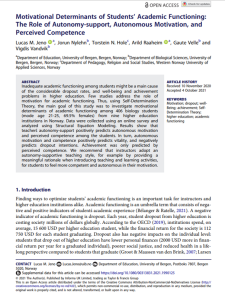New publication on the role of motivation for academic functioning.
 A new study has been published by several bioCEED members. The study is based on a national representative survey conducted among biology students in Norway in 2018. A total of 406 students across all higher education institutions that offers a general biology education responded on this survey. The researchers were interested in whether students´ goals for starting their biology education, and support of their teacher, had an impact on their motivation for actual studying biology. In turn, the researchers were interested if these motivational variables would increase their end-of-the-year grades, dropout intentions, and psychological well-being. In general, the results were supported and there are many implications for practitioners. First, the results suggest that to the extent that instructors provide meaningful choices to their students, provide formative feedback and scaffolding, and genuinely care for their students, the students´ motivation and mastery increases. The results showed that students that had motivation that was characterized by interest, enjoyment, and value, and that experienced mastery of the subject, had higher grades, psychological. They were also less likely to report intentions of dropping out of their study.
A new study has been published by several bioCEED members. The study is based on a national representative survey conducted among biology students in Norway in 2018. A total of 406 students across all higher education institutions that offers a general biology education responded on this survey. The researchers were interested in whether students´ goals for starting their biology education, and support of their teacher, had an impact on their motivation for actual studying biology. In turn, the researchers were interested if these motivational variables would increase their end-of-the-year grades, dropout intentions, and psychological well-being. In general, the results were supported and there are many implications for practitioners. First, the results suggest that to the extent that instructors provide meaningful choices to their students, provide formative feedback and scaffolding, and genuinely care for their students, the students´ motivation and mastery increases. The results showed that students that had motivation that was characterized by interest, enjoyment, and value, and that experienced mastery of the subject, had higher grades, psychological. They were also less likely to report intentions of dropping out of their study.
Abstract
Inadequate academic functioning among students might be a main cause of the considerable dropout rates, and well-being and achievement problems in higher education. Few studies address the role of motivation for academic functioning. Thus, using Self-Determination Theory, the main goal of this study was to investigate motivational determinants of academic functioning among 406 biology students (mode age 21-25, 69.5% females) from nine higher education institutions in Norway. Data were collected using an online survey and analyzed using Structural Equation Modeling. Results show that teacherś autonomy-support positively predicts autonomous motivation and perceived competence among the students. In turn, autonomous motivation and competence positively predicts vitality, and negatively predicts dropout intentions. Achievement was only predicted by perceived competence. We recommend that instructors adopt an autonomy-supportive teaching style, for example by providing a meaningful rationale when introducing teaching and learning activities, for students to feel more competent and autonomous in their motivation.
Keywords: Motivation, dropout, well-Being, achievement, Self-Determination Theory, higher education, academic functioning.
References and link to the article
Jeno, L. M., Nylehn, J., Hole, T. N., Raaheim, A., Velle, G. and Vandvik, V. (2021). Motivational Determinants of Students’ Academic Functioning: The Role of Autonomy-support, Autonomous Motivation, and Perceived Competence. Scandinavian Journal of Educational Research DOI: 10.1080/00313831.2021.1990125



